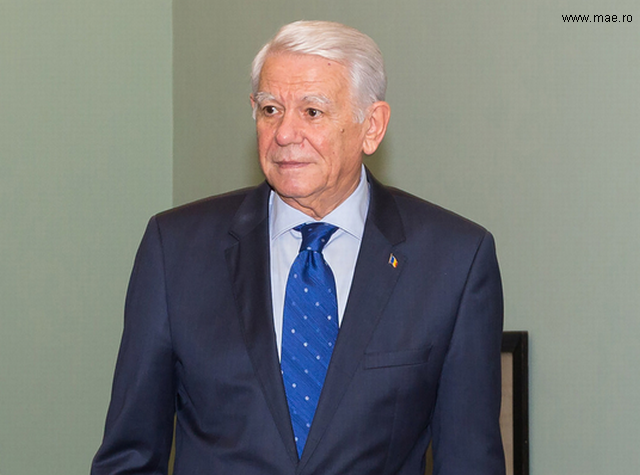Romania and cyber-security
A NATO member since 2004 and a EU member since 2007, Romania is fully committed to the security policy.

Corina Cristea, 10.11.2017, 13:56
A NATO member since 2004 and a EU member since 2007, Romania is fully committed, alongside the other member states, to the security policy and everything related to it. In an interview on Radio Romania, foreign minister Teodor Meleşcanu underlined that Bucharest pays special heed to the global foreign policy and security strategy as well as to the cooperation between the EU and the North-Atlantic Alliance.
Teodor Melescanu: “Romania is nowadays not only a beneficiary of NATO, but also a key player in establishing and reaching the allied goals, if we speak of either consolidating NATO’s defence and deterrence posture on the eastern flank, keeping the balance and coherence between the northern and southern regions, or of hosting the anti-missile defence system, of the very significant contribution it has had in Afghanistan or the support we provide for Ukraine’s cyber-security. Increasing defence spending to 2% of the GDP this year has enhanced our credibility at international level, too. We should establish and certify these capacities in the run up to the 2018 NATO Summit”.
Having convened this week in Brussels, in a meeting that focused on NATO’s efforts to adapt to the challenges of the 21st century, the NATO defence ministers analysed measures to improve the movement of allied military forces, over the Atlantic and across Europe, ways to tighten cyber defence, North Korea’s arming program as well as supplementing the number of troops in Afghanistan.
NATO has decided to set up two new commands to boost its capacity to intervene in support of the allied countries, especially the European states, in case of a conflict – “a Command for the Atlantic, to ensure that sea lines of communication between Europe and North America remain free and secure” and “a new Command to improve the movement of military forces across Europe and ways to strengthen the logistical function across the NATO Command Structure”, said NATO Secretary General Jens Stoltenberg.
The defence ministers decided, on the other hand, to integrate national cyber defence means into those of the Alliance. “We will integrate national cyber capabilities into NATO missions and operations as we integrate their conventional capabilities, being it ships, tanks, planes. It will still be under full national control, it will be national capabilities but they will be integrated into NATO missions and operations,” Jens Stoltenberg has explained.
The security issue has gained a new dimension and this has to do with cyber security. “No country can fare well on its own and therefore a concrete package of measures has been proposed within the European Commission, one of them being the common framework for the certification of security products”, the European Commissioner for Digital Economy and Society, Mariya Gabriel said in Bucharest. To us, this is a huge step forward, the commissioner has added. On the one hand, consumers should know the exact security level of a product, and on the other hand, we want to bring benefits to the European companies, a certificate which should be recognised all across the European Union, reducing the administrative and financial burden.
The issue has been debated during an international conference titled “The New Global Challenges in Cyber Security”, an event focussed on the potential of the digital sector. “At present, too much content available online instigates to terrorism or radicalisation. 41% of the content already marked as illegal is not removed, and 28% of it is still available online for more than 24 hours. It is well known that such materials have the highest impact within the first two hours”, the European official has added.
According to the minister delegate for European Affairs, Victor Negrescu, “each year, the costs entailed by the lack of online protection amounts to 400 million dollars. If we fail to achieve, at European and national level, what we intended to do, the costs might amount to 2.1 trillion dollars, which is huge and which will also have an impact on consumers and not only on companies and public administration.” Romania should get more actively involved in setting up a real cyber security market and should consolidate its position of regional leader in the field, Romanian communications minister Lucian Şova has also said. He pointed out that citizens and companies in particular, should be aware of cyber threats and not only of the advantages brought about by a fast exchange of information on the Internet.
Lucian Şova: “We should encourage the business environment to understand and become aware of the cyber threats which are so frequent, and on the other hand, to actively contribute to setting up a fair and functional market which should enhance cyber-security.”
Figures show that by 2020 there will be 4.1 billion internet users and over 26 billion network devices, that is three times more than the global population. In economic terms, this brings a significant advantage to the European development and implicitly to the global one. According to estimates, the digital sector might yield over a trillion dollars by 2020, but it will also generate costs. Statistical figures already show that more than half of the European companies have faced one cyber attack so far.
(Translated by Diana Vijeu)






























